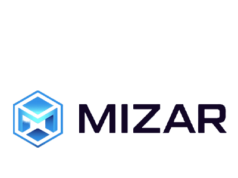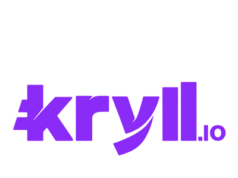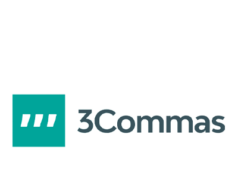Even when a position in forex is live for a split second, traders will always incur the spread. Brokers work quite hard to ensure we can trade this market seamlessly with minor glitches, and the spread is the mark-up to compensate for their efforts.
Fortunately, this cost isn’t astronomical for most currencies, but what if you could get it even lower? Well, this is where forex brokers with zero spread come in. Zero spread accounts aren’t so prevalent in the industry, although more companies will probably hop onto the bandwagon over time.
Luckily, we have narrowed down your search to only the 5 top zero spread forex brokers considering regulation, commissions, deposit requirements, market selection, customer service, and generally favorable trading conditions.
This article will also cover some useful information on the advantages and disadvantages of zero spread accounts.
Which are the best zero spread brokers for 2022?
They say variety is the spice of life. Thus, we have provided the top 5 zero spread brokers, including their USP, main features, overview, and some pros and cons to note.
XM: Best Overall
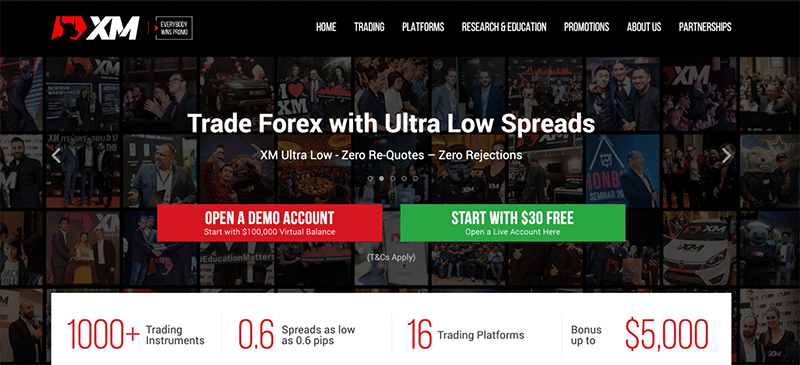
Features
- MT4, MT5 trading platforms
- Market execution
- 57 currency pairs
- Max. 300 positions at a time
- 1:888 max. leverage
- No commission
- $5 minimum deposit
- USD, EUR, GBP, JPY, CHF, AUD, HUF, PLN, RUB, SGD, and ZAR base account currencies
- Margin call/stop out: 50%/20%
While XM doesn’t technically offer a zero spread account, their spreads are ultra-low, at a minimum of 0.6 pips. The broker provides trading in eight asset classes (over 1000 individual instruments) across 16 platforms.
XM was established in 2009 and is regulated by the FSC (Belize), CySEC (Cyprus), DFSA (Dubai), and ASIC (Australia). The broker provides what we feel are the fairest conditions of a no deposit bonus for new clients.
First-time users can test-drive XM’s trading conditions at $30 with reasonable Ts and Cs for profit withdrawal. Alternatively, you can fund their Ultra-Low Account with just $5 and choose from 11 options as your base currency.
Advantages
- Multi-regulated
- Been in existence since 2009
- Comprehensive market selection
- Offers fair conditions for no deposit bonus
- Multiple base currency denominations
- Many secure payment methods are available
Disadvantages
- Inactivity fee applies
FXTM: Best For Flexible Commission Rates
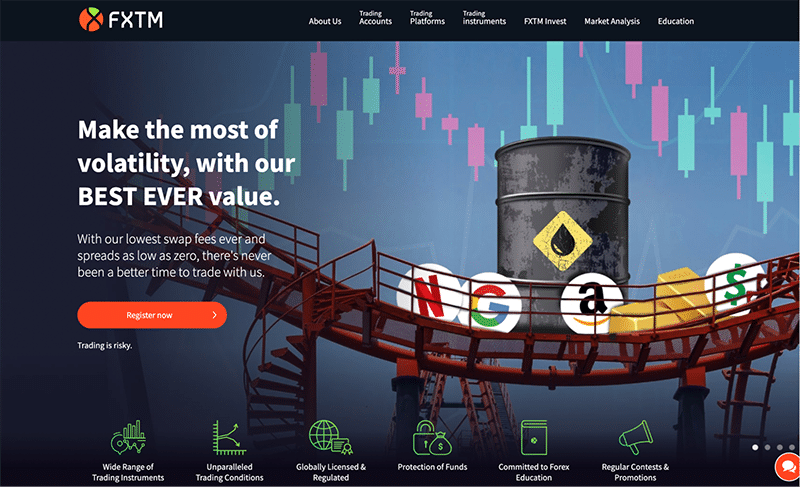
Features
- MT4, MT5 trading platforms
- Market execution
- 63 forex pairs
- Unlimited number of positions
- 1:2000 max. floating leverage
- Flexible commission on MT4; up to $4 per lot on MT4
- $/€/£ 500 minimum deposit
- USD, GBP, EUR, and NGN base account currencies
- Margin call/stop out: 80%/50%
FXTM or Forextime is a derivatives broker started in 2011. The company has its headquarters in Mauritius and regional offices in India, Indonesia, and Nigeria. FXTM’s zero spread account is called the Advantage account, which you can use with both MT4 and MT5.
One of the unique features is the broker has flexible commission rates for MT4 traders (an average of $0.40 to $2 per lot) depending on your equity and volume. The bigger your account and the more you trade, the less commission you pay.
Aside from FX, you can also trade metals, indices, FX indices, commodities, and stocks with Advantage.
- Regulated by FCA, CySEC, and FSC
- One of the highest leverage for zero spread accounts
- Several base account currencies provided
- 24/5 phone support
- The broad selection of payment methods
- Wide choice of currency pairs
Disadvantages
- High minimum deposit
- The inactivity fee applies after six months
IC Markets: Best for Experienced Traders
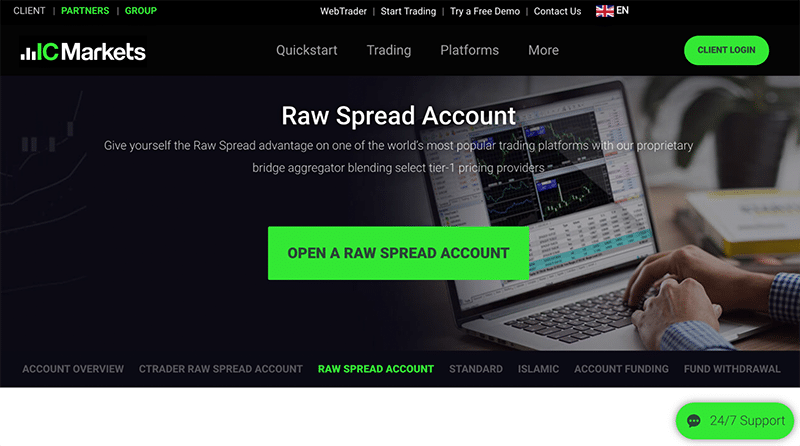
Features
- MT4, MT5 trading platforms
- Market execution
- 64 forex pairs
- Unlimited number of positions
- 1:500 max. leverage
- Up to $3.50 per lot/side
- $200 minimum deposit
- USD, AUD, EUR, GBP, SGD, NZD, JPY, CHF, HKD, and CAD base account currencies
- Margin call/stop out: 100%/50%
According to the latest statistics by The Tokenist derived from several financial institutions, IC Markets (International Capital Markets) is the largest forex broker by trading volume.
A recent article from Finance Magnates reported the Australian-based firm processed more than $1 trillion in volume for November 2021. With such achievements, it’s clear IC Markets is all about size, longevity, and global reputation.
Yet, it’s also accessible to all experience levels, from the most monied to the most cash-strapped investors worldwide. IC Markets is the best overall for a few reasons. Firstly, $200 is the initial opening balance for their zero/Raw Spread account.
You can trade 64 currency pairs and a host of other securities on both the MT4 and MT5 platforms. The broker charges a reasonable $3.50 per lot/side. Moreover, IC Markets is one of the few brokers where traders can open their accounts in 10 different currencies.
These are some of the reasons IC Markets is, overall, one of the best zero spread forex brokers.
Advantages
- One of the largest multi-regulated brokers by trading volume globally
- Zero spread account available on MT4 and MT5
- Wide selection of markets provided
- Reasonably high leverage
- No inactivity fee
- Several payment options provided
- Many base account currencies offered
Disadvantages
- No negative balance protection provided
Tickmill: Best For Low Commissions
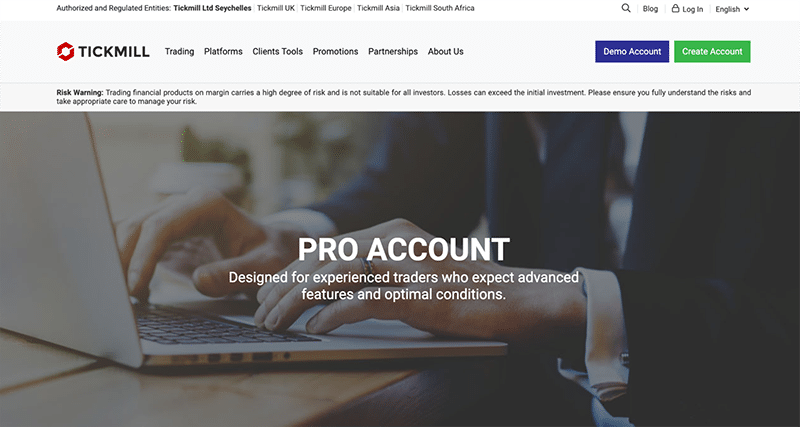
Features
- MT4, MT5 trading platforms
- Market execution
- 62 forex pairs
- 1:500 maximum leverage
- $2 per lot/side
- $100 minimum deposit
- USD, EUR, GBP base account currencies
- Margin call/stop out: 100%/30%
Established in 2014, Tickmill claims to serve over 150 000 clients in most parts of the globe. The broker is regulated in South Africa, Asia, Europe, Malaysia, Seychelles, and the United Kingdom, with registered offices in the latter three regions.
Tickmill prides itself on low trading costs by ‘thinking low’ where many ‘think big.’ As such, their commissions on the zero spread/Pro account are a reasonable $2 per lot/side, one of the lowest rates across all forex brokers.
No commissions apply when funding or withdrawing through VISA/Mastercard, Skrill, and bank transfer. Plus, a $100 minimum deposit is an affordable amount to start trading forex, indices, precious metals, oil, bonds, and cryptocurrencies with the lowest spreads possible.
Ultimately, if you’re really cost-sensitive and conscious about your pocket, then Tickmill is worth a try.
Advantages
- Multi-regulated
- MT4 and MT5 platforms provided
- One of the lowest zero spread commissions in the industry
- Reasonable $100 minimum deposit
- Clients can open their accounts in USD, EUR, and GBP
- Offers three different accounts
Disadvantages
- Tight margin call percentage
HotForex: Best For Reasonable Minimum Deposit
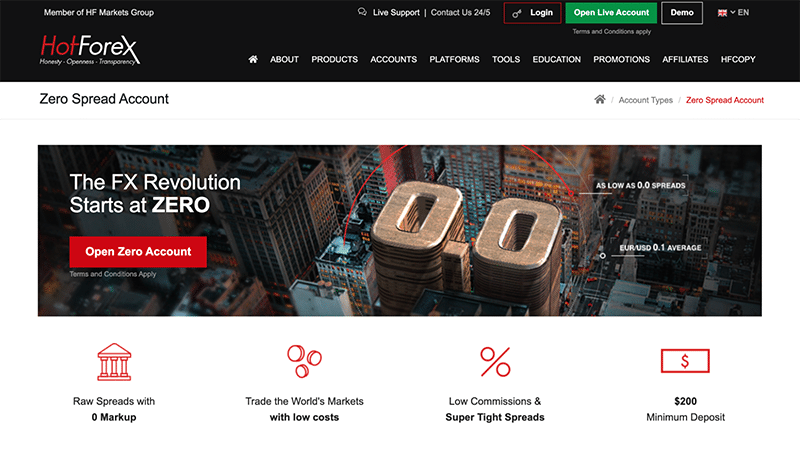
Features
- MT4, MT5 trading platforms
- Market execution
- 43 forex pairs
- 500 max. open orders
- 1:500 max. leverage
- $6-$8 per lot/round turn
- $200 minimum deposit
- USD, EUR, NGN, JPY, ZAR base account currencies
- Margin call/stop out: 50%/20%
HotForex has been in business for more than a decade, staying to its mantra of HOT: honesty, openness, and transparency. The broker claims to have opened over 2 million live accounts and is regulated in Cyprus, the United Kingdom, Mauritius, Dubai, Seychelles, and South Africa.
HotForex serves both retail and institutional clients to trade just over 1200 markets through different trading accounts, one of them being, of course, the zero spread. The conditions for this facility are pretty reasonable.
For starters, the minimum to begin with initially is $200. Traders can receive the lowest spreads attainable across 43 currencies pairs with a relatively high maximum leverage of 1:500.
As with a few other brokers on this list, you can use the zero spread account on MT4 and MT5. Ultimately, while Tickmill’s zero spread starts from $100, $200 is still lower than most brokers providing this account.
Advantages
- Regulated in numerous regions globally
- Zero spread account available on MT4 and MT5
- Max. leverage of 1:500
- $200 account minimum
- Offers different accounts aside from zero spread
- Decent range of forex markets
Disadvantages
- Slightly high commissions
- Charges inactivity fee
FBS: Best For High Leverage
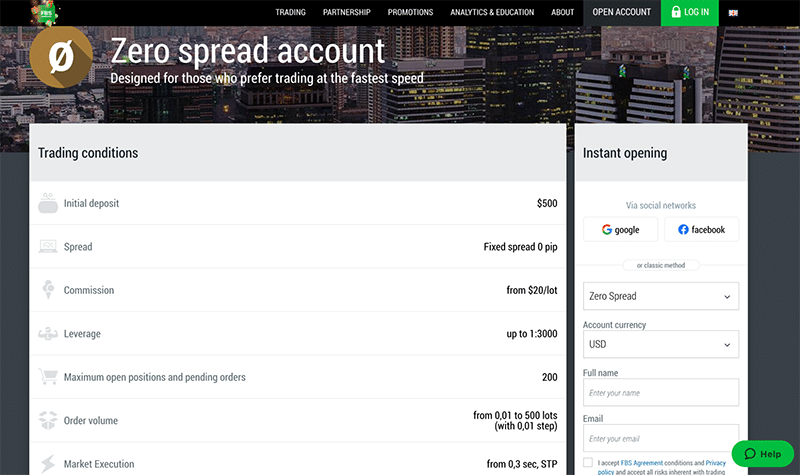
Features
- MT4 trading platform
- Market execution
- 28 forex pairs
- 1:300 max. leverage
- $20 per lot/side
- $500 minimum deposit
- USD, EUR base account currencies
- Margin call/stop out: 40%/20%
Founded in 2009, FBS is a derivatives brokerage regulated by CySEC and IFSC. Clients can trade currencies and metals on the ever-popular MetaTrader 4 platform for their zero spread account.
A demo version of this account is available to ‘test-drive’ the conditions. One of the advantages of FBS is having 1:3000 maximum leverage and margin call/stop out percentages of 40%/20%, which may be attractive for traders with more aggressive, high-risk strategies.
For just $500, FBS is a suitable option for those who want to trade with high leverage through a well-known, regulated broker.
Advantages
- CySEC-regulated
- High leverage
- Flexible margin call/stop out levels
- Offers many other accounts aside from zero spread
- There are several funding and withdrawal options available
Disadvantages
- The expensive commission per lot/side
- $500 minimum deposit
- Low selection of forex pairs
- Only provides trading on the MT4 platform
Exness: Best For Highest Selection Of Forex Markets
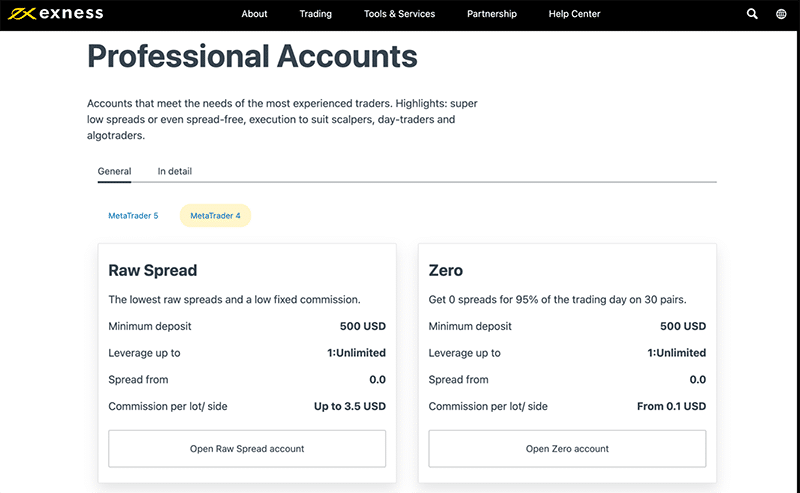
Features
- MT4, MT5 trading platforms
- Market execution
- 107 forex pairs
- Unlimited number of positions
- Unlimited leverage
- Up to $3.50 per lot/side
- $200 minimum deposit
- 45 base account currencies like USD, EUR, GBP, JPY, etc.
- Margin call/stop out: 30%/0%
According to a recent report by Finance Magnates, Exness reached over $1 trillion in trading volume for three consecutive months. This milestone exemplifies the amount of demand the broker experienced in 2021.
Founded in 2008 by two Russian entrepreneurs, Exness is licensed by several regulators, namely FCA, CySEC, FSCA, FSC, CBCS, and FSA. The broker provides two low-spread accounts, Raw and Zero.
The spreads begin from zero on the Raw account with a fair commission of up to $3.50 per lot/side. The Zero account is where the spreads are actually zero for 95% of the trading day across 30 pairs with commissions starting from $0.1 per trade.
What particularly stands out with Exness is their market selection, consisting of 107 currency pairs, 13 crypto pairs, 12 metals, and 81 stocks/indices.
The minimum deposit is $500 for both accounts, with traders able to use unrestricted leverage and open an unlimited number of positions without restrictions on lot sizes or frequency.
All in all, Exness might be a better alternative than FBS for high-frequency traders or those using aggressive strategies.
Advantages
- Licensed by many regulators
- Traders can open their accounts in 45 base currencies
- Unlimited leverage
- Trading available on MT4 and MT5
- Provides a broad range of forex and non-forex markets
- Reasonable commission for zero spread accounts
Disadvantages
- $500 minimum deposit
- Zero account has no transparent fee structure
What is a zero spread account?
A zero (or raw) spread account in forex is a type of account where the spreads are fixed and lower than those on a standard account. Technically, the term ‘zero’ is a misnomer as the spreads don’t actually start from this point.
The name is a way to promote the low-cost advantages of using the account. Traders receive tighter spreads than usual with any zero spread forex broker and pay a set commission per trade.
This can be per side (for opening a position) or per round turn (opening and closing a position). In this way, the trading costs are more predictable than a variable spread account.
This quality makes the zero spread account suitable, particularly for high-frequency traders or those using robots because the spreads can be pretty high with recurrent execution.
Moreover, those trading exotic pairs can benefit from this facility as these markets have the highest spreads in the industry. Generally, your position sizes can be slightly larger with this account because you don’t have to compensate for the spread.
Pros and cons of using a zero spread account in forex
Let’s explore some of the good and bad things about zero spread accounts.
Pros
- The main benefit of this account is the cost predictability because of the fixed commissions. Traders pay lower spreads than usual.
- This account is essential for traders opening positions in exotic pairs where the spreads are naturally steep.
- In many cases, the spreads never widen, and when they do, it’s not as pronounced as on a standard account.
Cons
- The minimum deposit for these accounts usually starts from $200 or even $500 with some brokers, a lot higher than standard and micro-accounts. This means there’s a high barrier to entry.
- Routinely, if the initial account opening size is greater, the leverage is reduced.
- The margin call and stop-out levels can be stricter on this account.
- The trading costs may not be considerably cheaper in the long run on a zero spread account, depending on the amount of commission and execution frequency.
- In some instances, the spreads can widen. Therefore, the spreads aren’t always necessarily lower than with a standard account.
Factors to consider when choosing forex brokers with zero spread accounts
Here are the main factors to observe when looking at zero spread forex brokers.
Look for trusted and regulated brokers
Whether you’re looking for a zero spread or another type of account, you’ll need to ensure your potential broker is appropriately regulated. Regulation isn’t foolproof, but it minimizes the chances of financial malpractice so that clients are always treated professionally and ethically.
Forex brokers with zero spread should be regulated by any of the following top-tier regulators, namely:
- ASIC (Australian Securities and Investments Commission) – primarily for Australia
- CySEC (Cyprus Securities and Exchange Commission) – primarily for most of Europe
- CFTC (Commodity Futures Trading Commission) – primarily for the United States
- FCA (Financial Conduct Authority) – primarily for the United Kingdom
There are other highly-regarded regulators from Europe, Asia, and North America as well, but generally, those mentioned previously are the most common.
Compare the spreads, commissions, and other trading costs
In this regard, there are several fees to consider. Firstly, you’ll want to compare the extent of the spreads and the per-order commissions of the instruments you plan to trade. Of course, you’re looking for the lowest across the board.
What’s particularly worth noting is whether the broker charges a commission per side or round turn. The former is a cheaper option as traders are only charged once rather than twice.
Other trading costs include whether the broker charges for depositing and withdrawal (depending on the channel used), inactivity fees, and conversion fees.
Observe the minimum deposit requirement
As already mentioned, the minimum deposit is typically greater with zero spread forex brokers. Therefore, whichever company you choose, make sure you can afford the starting balance.
Explore the broker’s range of tradable markets
Customers need brokers with as many forex pairs under one roof as possible for convenience and familiarity. Some zero spread accounts might not provide a broader range of markets aside from the major and minor pairs.
Find out the customer support options available
Clients deserve the best and most accessible support options as with any financial services provider. In the potential broker, you’d select, one has to make sure they have a functioning live chat, along with a telephone line and email contact.
Some brokers go the extra mile to include a way for users to contact them through instant messaging networks such as WhatsApp and Telegram.
FAQs about zero spread forex brokers
Why are tight spreads good?
Tight spreads are essential if you’re a high-frequency trader, whether through mechanical or discretionary means. While the cost of opening a position in forex is typically low, these accumulate over time and can affect a trader’s bottom line.
This is especially true if your profit targets are relatively small. Therefore, without a tight spread, your gains are lessened. A tight spread is also good when trading in more volatile periods where spreads are known to increase.
What is the difference between a zero spread account and a standard account?
The main difference boils down to commissions. A regulated and fair broker should not charge anything other than the spread with a standard account (excluding any swaps). With zero spread, the spread is lower than on a standard account with a small commission.
Yet, as already mentioned, zero spread accounts tend to require larger starting balances for first-time users, have lower leverage, stricter margin call and stop out levels, and other minor differences.
Should you consider a zero spread account?
If you’re a scalper or consider yourself a frequent trader, use robots, trade the news, or trade exotic pairs, then a zero spread account is beneficial.

